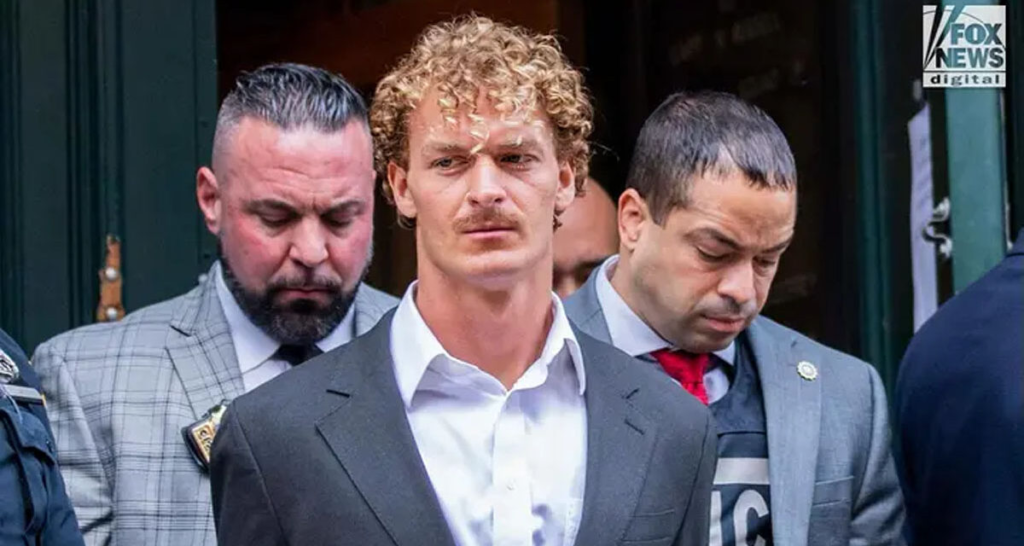
In a recent incident on a New York City subway, a former Marine named Daniel Penny found himself caught in a life-or-death situation.
“I’m sitting on a train reading my book, and, all of a sudden, I hear someone spewing this rhetoric. He said, ‘I don’t care if I have to kill an F, I will. I’ll go to jail, I’ll take a bullet,’” recalled a passenger.
“I’m looking at where we are in the tube, in the sardine can, and I’m like, ‘OK, we’re in between stations. There’s nowhere we can go,’” she said. “The people on that train, we were scared. We were scared for our lives.”
As video footage captured the scene, Penny was seen pinning down an agitated fellow passenger, Jordan Neely, in a chokehold. Tragically, Neely later succumbed to compression of the neck and passed away. This unfortunate event has sparked a fierce debate, with Republican presidential hopefuls rushing to defend Penny, while Democrats and racial justice advocates express concern over the implications of such support.
For many Republicans, Penny has become a symbol of a Good Samaritan, stepping in to protect others in a city they perceive as struggling with rising crime rates under Democratic leadership. Their support remains steadfast, despite the racial dynamics at play: Penny is white, and Neely was a Black individual who did not physically harm anyone on the train before being restrained.
This rush to defend Penny echoes the fervor displayed by Republicans during the 2020 presidential election in their support of Kyle Rittenhouse, a white teenager who killed two individuals during protests in Wisconsin. Similarly, Texas Governor Greg Abbott recently pledged to pardon Daniel Perry, a white Army sergeant convicted of fatally shooting an armed man during a Black Lives Matter protest in Austin.
Republicans have strategically made rising crime rates a political liability for Democrats, positioning themselves as the party of law and order. This messaging, however, has faced criticism from Democrats and racial justice advocates who argue that it plays on deep-seated racism and exacerbates divisions within society.
Critics question whether Penny’s actions can be justified, particularly in the context of his supporters’ comparison to other incidents involving racial dynamics. They point to the disparate treatment received by Ashli Babbitt, a white former Air Force veteran shot by a Black police officer during the January 6, 2021, insurrection at the U.S. Capitol. Babbitt was mourned by Republicans as a martyr, while the officer who shot her was labeled a “thug” by former President Donald Trump.
The case of Daniel Penny raises legal ambiguities that some individuals from both parties overlook. Christopher Borick, director of the Muhlenberg College Institute of Public Opinion, suggests that GOP presidential candidates see Penny’s cause as a means to energize their party’s base. They capitalize on the narrative of urban decay and a perceived threat from “crazies,” presenting themselves as protectors of everyday Americans.
While prominent Republicans enthusiastically support Penny, critics argue that they may also advocate for policies that disproportionately affect marginalized communities, such as cuts to social programs that could have benefited someone like Neely. This contradiction raises questions about the underlying motivations behind their support.
On the Democratic side, Rep. Alexandria Ocasio-Cortez and New York Mayor Eric Adams have expressed their concerns about Neely’s death. However, they have also cautioned against making irresponsible statements before all the facts are known. The Rev. Al Sharpton indirectly responded to Penny’s supporters during Neely’s funeral, emphasizing that true Good Samaritans do not resort to violence.
As the legal proceedings unfold, it is essential to remember that Daniel Penny is neither a vigilante nor a murderer. He did not actively seek out trouble but found himself in a situation where he felt compelled to protect others from a mentally unstable and potentially dangerous individual. The legal framework in New York permits citizens to defend themselves and others using reasonable force against perceived threats.
Penny’s actions must be evaluated within the context of the circumstances he faced. He asked fellow passengers to call the police, remained at the scene until they arrived, and did not display any criminal intent.
If Penny is convicted, what does this mean for society? Will it mean true criminals and mentally unbalanced individuals like Neeley will be allowed to kill people and commit crimes without interference from Good Samaritans like Penny? Someone may want to ask Penny if it was worth it?
Original Article: https://punchingbagpost.com/understanding-daniel-penny-a-good-samaritan-in-the-face-of-danger/




